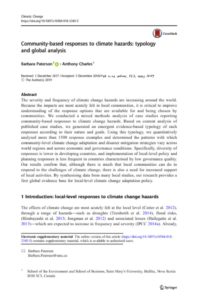23 Apr Community-based responses to climate hazards: typology and global analysis
Abstract
Barbara Paterson & Anthony Charles
The severity and frequency of climate change hazards are increasing around the world. Because the impacts are most acutely felt in local communities, it is critical to improve understanding of the response options that are available for and being chosen by communities. We conducted a mixed methods analysis of case studies reporting community-based responses to climate change hazards. Based on content analysis of published case studies, we generated an emergent evidence-based typology of such responses according to their nature and goals. Using this typology, we quantitatively analysed more than 1500 response examples and determined the patterns with which community-level climate change adaptation and disaster mitigation strategies vary across world regions and across economic and governance conditions. Specifically, diversity of responses is lower in developing countries, and implementation of local-level policy and planning responses is less frequent in countries characterised by low governance quality. Our results confirm that, although there is much that local communities can do to respond to the challenges of climate change, there is also a need for increased support of local activities. By synthesising data from many local studies, our research provides a first global evidence base for local-level climate change adaptation policy.



